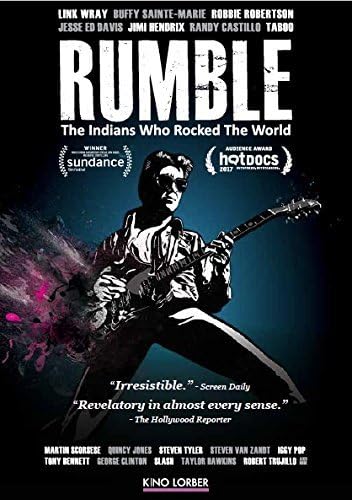
Just when it seems like books and documentaries have thoroughly covered the history of rock ‘n’ roll, along comes a film that reveals a rarely told story: the influence of Native Americans on the genre. From Link Wray to the Black Eyed Peas’ Taboo, Native Americans have impacted rock rhythmically, vocally, thematically, and culturally. Rumble: The Indians Who Rocked the World explores rock’s Native American roots through interviews and archival footage, demonstrating how the blues, jazz, and rock all owe a debt to Indian rhythms and vocal style.
Buy Rumble – The Indians Who Rocked the WorldThe documentary borrows its title from Wray’s seminal 1958 song “Rumble,” with guitarists such as Slash and Foo Fighters’ Taylor Hawkins crediting Wray with inventing the power chord. In addition, “Rumble” remains among the few instrumentals banned from the radio for fear that its distorted guitar would incite violence. From there Rumble proceeds to New Orleans, where Mardi Gras intermixes African and Indian cultures. Interviews with blues pioneers such as Buddy Guy also reveal how Native American rhythms and songs of protest influenced the blues, with Charley Patton inventing Delta Blues by hitting his guitar like a drum. Tony Bennett extolls the virtues of Mildred Bailey, a highly influential jazz singer who modeled her vocal techniques through the Native American songs of her youth.
Other musicians profiled include Buffy Sainte-Marie, a folk singer whose initial success was unfairly cut short by her political activism; Jimi Hendrix, who claimed Native-American ancestry and often wore elements of traditional clothing; and Robbie Robertson, cofounder of the Band. Robinson’s interviews discussing how he learned to embrace his ancestry prove fascinating.
Where Rumble particularly shines is in its profiles of lesser-known but highly influential musicians. The late Jesse Ed Davis proved an in-demand guitarist, working with Taj Mahal, John Lennon, and Jackson Browne (Davis performed the famous guitar solo on “Doctor My Eyes”). Randy Castillo, who emerged as an influential heavy metal drummer, dazzled audiences with his powerful style while on tour with Ozzy Osbourne, among others. Finally, Pat Vegas from the group Redbone—best known for their pop/rock hit “Come and Get Your Love”—discusses how the band would perform traditional Native American dances during their live shows. Vegas reveals that Hendrix encouraged the band to utilize its heritage to differentiate themselves from other groups of the time.
While Rumble surveys major artists with Native American roots, it would have been even more beneficial to illustrate how traditional music evolved. Learning about instrumentation, songwriting techniques, and vocalization in Native American history would have better clarified the specific contributions the genre made to rock, blues, gospel, and folk.
The term “rumble” may conjure images of physical confrontation, but the documentary uses the word in a different sense. Like Wray’s song of the same name, “rumble” can also signify revolution, uprising, and change. Indeed, the artists profiled in the film accomplished such feats through their music, forever impacting the history of rock and other genres. Spotlighting a subject deserving of more attention, Rumble is must-viewing for any music fan.